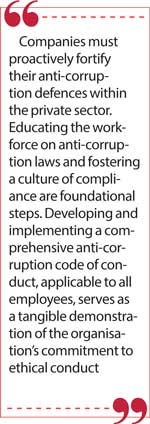Monday Feb 16, 2026
Monday Feb 16, 2026
Thursday, 21 March 2024 00:22 - - {{hitsCtrl.values.hits}}

Corruption extends beyond bribery and encompasses improper conduct
by individuals in positions of authority or power
 Bribery: Corporate responsibility
Bribery: Corporate responsibility
In recent years, Sri Lanka has taken significant strides in its battle against corruption, marked by the transformation of the once exclusively Government-focused Bribery Act into the more comprehensive Anti-Corruption Act. This legislative evolution now extends the arm of accountability to encompass private sector entities, marking a pivotal shift in the nation’s anti-corruption landscape.
Under the amended Anti-Corruption Act, private sector individuals, such as purchasing managers, are now subject to scrutiny and potential legal ramifications for engaging in bribery. The Sri Lankan Anti-Corruption Authority wields authority to investigate and prosecute such offenses, signalling a newfound commitment to root out corruption across all sectors.
However, the impact of these measures transcends individual accountability, exerting significant pressure on the companies employing implicated individuals. Beyond legal repercussions, companies face the daunting task of safeguarding their reputation and integrity in the face of potential scandals.
An incident involving an employee’s involvement in bribery not only tarnishes the individual’s credibility but also casts a shadow of doubt on the company’s commitment to ethical business practices.
Section 106 of the Anti-Corruption Act serves as the cornerstone of this expanded jurisdiction, aligning with international standards endorsed by institutions like the International Monetary Fund (IMF). The IMF’s endorsement underscores the critical role of anti-corruption efforts in fostering economic growth and stability, urging nations like Sri Lanka to prioritise robust measures to combat corruption.
In response, companies must proactively fortify their anti-corruption defences within the private sector. Educating the workforce on anti-corruption laws and fostering a culture of compliance are foundational steps. Developing and implementing a comprehensive anti-corruption code of conduct, applicable to all employees, serves as a tangible demonstration of the organisation’s commitment to ethical conduct.
Several leading companies in Sri Lanka have already embraced these principles, integrating ant-corruption initiatives into their corporate ethos. However, in the absence of specific local regulations, adopting international best practices becomes imperative. Drawing from global standards, companies can enhance their anti-corruption measures by implementing rigorous compliance protocols and whistleblower protection mechanisms.
In essence, as Sri Lanka navigates its anti-corruption journey, the private sector’s proactive engagement in combating bribery is not only a legal obligation but also a strategic imperative for sustaining trust, integrity, and competitiveness in the global marketplace. By adhering to robust anti-corruption measures, companies can safeguard their reputation while contributing to a culture of transparency and accountability essential for long-term economic prosperity.
1. Policy on Anti-Bribery and Corruption Mandatory for Listed Companies:
- As per the Corporate Governance listing rules Section 9.2.1 (i) it is mandatory that all Listed Companies listed on the Colombo Stock Exchange must publish its Policy on Anti-Bribery and Corruption by 1 October 2024
- Crafting a comprehensive anti-corruption policy endorsed by the board of directors establishes a clear framework for ethical conduct, showcasing the organisation’s unwavering commitment to integrity and transparency.
2. Staff compliance:
- It’s imperative to ensure that the anti-corruption policy is effectively communicated to all staff members, fostering a deep understanding of ethical standards. Training programs play a crucial role in equipping employees to identify and address corrupt practices proactively. It will become necessary for companies to have a code of conduct for its staff on Anti-Corruption based on its policies
3. Regulatory alignment:
- Regularly reviewing and updating anti-corruption policies to align with emerging regulations is vital for maintaining compliance with evolving legal mandates and international norms.
4. Global benchmarking:
- Drawing insights from global leaders in anti-corruption practices offers valuable lessons for Sri Lankan corporations seeking to elevate their compliance strategies and adapt to international standards effectively.
5. Internal controls:
- Establishing robust internal controls, including rigorous oversight mechanisms, transparent reporting channels, and diligent monitoring processes, is essential for preventing, detecting, and addressing instances of corruption within the organisation.
6. Whistleblower protection:
- Implementing robust whistleblower protection mechanisms not only safeguards individuals who report suspected corruption but also fosters a culture of accountability and ethical responsibility throughout the organisation.
7. Third-party due diligence:
- Conducting thorough due diligence on third parties, such as vendors, contractors, and business partners, serves as a crucial safeguard against the risks of corruption associated with external entities, mitigating potential compliance breaches.
 By proactively embracing these best practices and customising them to suit Sri Lanka’s unique business landscape, companies can fortify their anti-corruption frameworks, mitigate risks, and uphold ethical standards. Flexibility in policy adaptation, coupled with unwavering leadership commitment, forms the cornerstone of cultivating a culture grounded in integrity and compliance, thereby fostering sustainable business practices and enduring success.
By proactively embracing these best practices and customising them to suit Sri Lanka’s unique business landscape, companies can fortify their anti-corruption frameworks, mitigate risks, and uphold ethical standards. Flexibility in policy adaptation, coupled with unwavering leadership commitment, forms the cornerstone of cultivating a culture grounded in integrity and compliance, thereby fostering sustainable business practices and enduring success.
Policies aimed at combating bribery and corruption play a pivotal role in maintaining operational integrity and adherence to regulatory standards. Here’s a breakdown of key elements within the policy framework outlined:
1. Commitment to ethical business practices: Emphasise the imperative of conducting business with honesty, integrity, and adherence to ethical principles, unequivocally rejecting any form of bribery or corruption.
2. Prohibition of unethical activities: Enforce stringent prohibitions against all forms of unethical conduct, including both direct and indirect bribery, whether through third-party intermediaries or other means.
3. Reporting mechanism: Establish clear and accessible channels for employees to report any suspected instances of bribery or corruption, ensuring confidentiality and protection for whistleblowers.
4. Addressing forms of bribery and corruption: Acknowledge and address various manifestations of bribery and corruption, such as payments to secure business advantages, political contributions, facilitation payments, and inappropriate gifts influencing business transactions.
5. Policy objectives:
- a) Legal compliance: Ensure strict adherence to anti-bribery and anti-corruption laws and regulations.
- b) Guidance: Provide comprehensive guidance to employees on identifying, reporting, and addressing bribery and corruption concerns.
- c) Oversight committee: Establish an Oversight Com-mittee comprising senior representatives from legal, compliance, human resources, and finance departments to oversee and enhance anti-corruption policies and practices.
- d) Risk assessment: Conduct regular assessments to identify and mitigate bribery and corruption risks, incorporating findings into policy enhancements and training initiatives.
6. Continuous improvement: Implement mechanisms for ongoing monitoring, evaluation, and enhancement of anti-corruption initiatives, ensuring adaptability to evolving risks and regulatory requirements, and fostering a culture of continuous improvement and compliance.
By incorporating these components into anti-corruption and anti-bribery policies, companies can bolster their organisational culture against unethical practices and foster a transparent and compliant business environment.
A bribe constitutes an inducement, reward, payment, or offering provided to any individual with the intent to unlawfully gain a contractual, regulatory, or personal advantage. This can encompass various forms of value, including money, gifts, services, inside information, entertainment, employment opportunities, charitable donations, or other favours, either given directly or through a third party.
Corruption extends beyond bribery and encompasses improper conduct by individuals in positions of authority or power. Such behaviours, whether illegal, unethical, or contrary to accepted standards, often involve acts of patronage and favours exchanged for personal, organisational, or political gains.
In the realm of corporate social responsibility, companies may engage in charitable donations for humanitarian causes or other socially responsible initiatives. However, it is crucial that such contributions adhere to the company’s internal policies and receive approval from the Board of Directors. Donations should never be made with the expectation of receiving something in return, as this could violate anti-corruption laws and the company’s code of conduct.
Regarding gifts, hospitality, and entertainment, companies must ensure that:
Overall, having clear guidelines and stringent policies concerning bribery, corruption, gifts, and entertainment is essential for companies to uphold ethical standards, comply with laws, and safeguard their integrity in business practices.
In the realm of corporate governance concerning gifts and hospitality, precision in defining terms and clarity in guidelines for accepting such benefits are imperative to ensure legal compliance and ethical conduct in business transactions.
1. Definitions:
2. Accepting gifts:
- General principle: While recognising the customary exchange of small gifts in business, employees must exercise prudence to ensure that such exchanges do not compromise their impartiality or raise concerns about conflicts of interest.
- Criteria for accepting gifts:
3. Guidelines for gifts exchange:
By delineating precise definitions and establishing clear parameters for the acceptance and exchange of gifts and hospitality, companies can navigate the legal landscape while upholding ethical standards.
These policies serve as bulwarks against conflicts of interest, ensuring transparency and trust in business relationships. Adherence to these guidelines is pivotal in safeguarding the company’s reputation and integrity, bolstering compliance with legal mandates, and promoting ethical conduct among employees and business associates.
Incorporating anti-corruption protocols, educational initiatives, and designating vigilance or compliance officers are pivotal steps that underscore a company’s unwavering commitment to maintaining elevated ethical standards and curtailing risks associated with bribery and corruption.
By seamlessly integrating these guidelines into the company’s policies and procedures, the Board of Directors can unmistakably showcase a resolute dedication to adherence, integrity, and ethical conduct across all organisational tiers. Consistent training programs and robust oversight mechanisms assume a critical role in nurturing a culture steeped in transparency and accountability, thereby fortifying the company’s reputation and credibility within the legal landscape.
(The writer is a legal professional associated with a boutique-style legal firm named Corporate Legal Consultants. He is a former Director General of the Securities and Exchange Commission of Sri Lanka and a former Senior Advisor at the Ministry of Finance. He could be contacted on